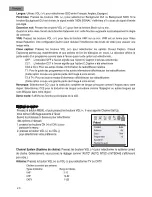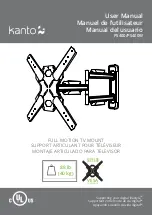
1 Safety Precautions
1.1. General Guide
1. It is advisable to insert an isolation transformer in the AC
supply before servicing a hot chassis.
2. When servicing, observe the original lead dress, especially
the lead dress in the high voltage circuits. If a short circuit is
found, replace all parts which have been overheated or
damaged by the short circuit.
3. After servicing, see to it that all the protective devices such
as insulation barriers, insulation papers, shields and
isolation R-C combinations, are properly installed.
4. When the receiver is not to be used for a long period of
time, unplug the power cord from the AC outlet.
5. Potential, as high as
32.0
kV is present when this receiver
is in operation. Operation of the receiver without the rear
cover involves the danger of a shock hazard from the
receiver power supply. Servicing should not be attempted
by anyone who is not thoroughly familiar with the
precautions necessary when working on high voltage
equipment. Always discharge the anode of the picture tube
to the receiver chassis before handling the tube.
6. After servicing make the following leakage current checks to
prevent the customer from being exposed to shock
hazards.
1.2. Leakage Current Cold Check
1. Unplug the AC cord and connect a jumper between the two
prongs on the plug.
2. Turn on the receiver’s power switch.
3. Measure the resistance value, with an ohmmeter, between
the jumper AC plug and each exposed metallic cabinet part
on the receiver, such as screw heads, aerials, connectors,
control shafts, etc. When the exposed metallic part has a
return path to the chassis, the reading should be between
4
M
Ω
Ω
Ω
Ω
and 20 M
Ω
Ω
Ω
Ω
. When the exposed metal does not have a
return path to the chassis, the reading must be infinite.
1.3. Leakage Current Hot Check
(See Fig. 1)
1. Plug the AC cord directly into the AC outlet. Do not use an
isolation transformer for this check.
2. Connect a 2k
Ω
, 10 W resistor in series with an exposed
metallic part on the receiver and an earth such as a water
pipe.
3. Use an AC voltmeter, with high impedance type, to
measure the potential across the resistor.
4. Check each exposed metallic part, and measure the
voltage at each point.
5. Reverse the AC plug in the AC outlet and repeat each of the
above measurements.
6. The potential any point should not exceed
1.0 V rms
. In the
case of a measurement being outside of the limits specified,
there is a possibility of a shock hazard, and the receiver
should be repaired and rechecked before it is returned to
the customer.
3
TX-29P150T
Summary of Contents for TX-29P150T
Page 25: ...7 CONDUCTOR VIEWS 7 1 A Board TNP4G167AC TX 29P150T 25 ...
Page 26: ...8 SCHEMATIC DIAGRAMS 8 1 SCHEMATIC DIAGRAM NOTES TX 29P150T 26 ...
Page 28: ...Main Board 2 2 TX 29P150T 28 1 3 5 7 9 11 13 15 17 19 21 23 25 27 29 ...
Page 29: ...8 1 2 Rear AV RGB STEREO Circuit TNP4G169AB TX 29P150T 29 ...
Page 30: ...8 1 3 Front AV Geomagnetic Circuit TNP4G171AB TX 29P150T 30 ...
Page 31: ...8 1 4 CRT Circuit TNP4G177AA TX 29P150T 31 ...
Page 32: ...8 1 5 Pincushion Circuit TNP4G181AA TX 29P150T 32 ...
Page 34: ...Digicomb Board 2 2 TX 29P150T 34 1 3 5 7 9 11 13 15 17 19 21 23 25 27 29 ...
Page 35: ...8 1 7 Digicomb2 Board TNP4G203AA TX 29P150T 35 ...
Page 36: ...9 PARTS LOCATION TX 29P150T 36 ...
Page 37: ...10 1 Replacement Parts List Notes 10 Replacement Parts List 37 TX 29P150T ...




































